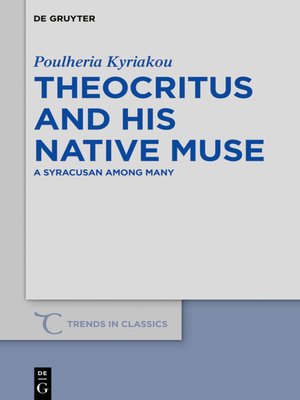Theocritus and his native Muse
ebook ∣ A Syracusan among many · Trends in Classics--Supplementary Volumes
By Poulheria Kyriakou

Sign up to save your library
With an OverDrive account, you can save your favorite libraries for at-a-glance information about availability. Find out more about OverDrive accounts.
Find this title in Libby, the library reading app by OverDrive.



Search for a digital library with this title
Title found at these libraries:
| Library Name | Distance |
|---|---|
| Loading... |
Hellenistic poets opted and were very likely expected to deal meaningfully, and perhaps competitively, with the tradition they inherited. They also needed to secure the goodwill of actual or potential patrons. Apollonius, the author of a novel heroic epic, eschews references to literary polemics and patronage. Callimachus often adopts a polemical stance against some colleagues in order to suggest his poetic excellence. Theocritus chooses a third way, which has not been investigated adequately. He avoids antagonism but ironizes the theme of poetic excellence and distances himself from the tradition of competitive success. He does not cast his narrators as superior to predecessors and contemporaries but stresses the advantages and merits of colleagues. This rejection of conceit is connected with a major strand in Theocritean poetry: the power of word, including song, to provide assistance to characters in distress is a major open issue. Language is versatile and potent but not all-powerful. Song gives pleasure but is not a panacea while instruction and advice are never helpful and may even prove harmful. Most genuine pieces are ambiguous and open-ended so that the aspirations of characters are not presented as doomed to failure.






